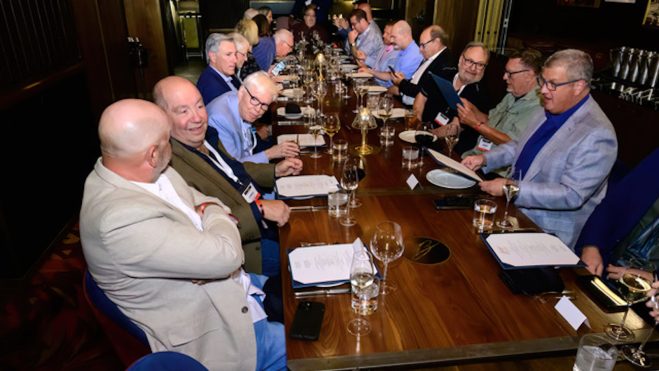Schuetz: I Have Always Been A VIP Host
The concept of catering to players is nothing new, but online access has certainly complicated it
8 min

“The gambling known as business looks with austere disfavor upon the business known as gambling.”
— Ambrose Bierce
The topic of VIP hosts in internet gaming environments has attracted considerable attention from the gaming and legacy media over the last several years, and this attention has been primarily driven by stories of excess. Most noticeable in this vein is the story by Anna Betts in The Guardian, published in February. It addresses the financial devastation delivered upon Lisa D’Alessandro and her two sons by a husband who had indisputably lost control of his gambling with DraftKings. Other stories, of course, can be placed in this Hall of Shame.

It is also the case that Jeff Edelstein made an excellent effort to back away from the main train wrecks and give a more balanced vantage point from which to view the VIP host practice, and such a presentation was due.
However, some horror stories are just that — horror stories. Since decisions are often made at the margins, these experiences must be minimized to avoid restrictive and overblown reactions to the problem. No one in the legalized and regulated world benefits from these horror stories and, if these stories continue, the industry will have to pay a price. The challenge is that the industry has proven particularly lax in imposing self-regulation and discipline.
Ms. D’Alessandro’s husband went from making 1,600 bets per year in 2020 to over 14,000 in 2023. His average monthly deposit amount in 2020 was $2,041; by 2023, it was $64,716. Moreover, according to her lawsuit, he lost essentially everything the family had saved — and more — from betting at levels well beyond his financial wherewithal.
As her husband’s gambling grew exponentially, he was introduced to DraftKings’ VIP hosts. These folks bond with the players, providing bonuses, incentives, gifts, special event tickets, and other complimentary items. In this case, they even awarded him something of a trophy. All of this heightened attention was obviously designed to maintain player loyalty to the vendor and keep him in action.
Hosts, however, whether emblazoned with the “VIP” designation or not, have been around the gambling business since I entered it over 50 years ago.
Service with a smile
As a general statement, the hosting function comes naturally in the casino business. During my early days in dealing cards and dice, I wanted to make sure the folks on my table were happy, be it with a pleasant greeting, ensuring they received cocktails and beverages when they wanted them, ensuring their ashtrays were attended to, and so forth. One of the biggest compliments I received as a dealer was when there was a very tough table and the pit boss told the floorman to put me in on the game because “Richard can polish a turd.” It was his way of saying that I could make the best of a bad situation.
My charm offensive was not because I wanted the players to lose, but just the opposite. I wanted them to win, for a winning player is more likely to tip, and tips were why I was in the building. So too, however, a losing player is more likely to tip if well treated; he or she just may be limited by the reality of running out of funds. I have written before about my dealing experiences and that, as a dealer, “sweetness was my weakness.”
As I moved up the ranks of the casino business, the importance of being a good host increased in terms of doing my job well. Not only did we rely on the personal touch, but we also offered serious perks in Las Vegas to offer our guests and maintain their loyalty.
We would take over 100 people to the Super Bowl, especially if it were in a western state. For a number of years, we took 76 of our players to a fishing lodge on an island in the Inside Passage of Alaska for five days to fish for salmon and halibut. We even had to hire a separate plane to return the flash-frozen catch. The players would come in a few days before the trip, and then off we would fly.
Several weeks after one of these trips, I received a call from a player who noted that he enjoyed an excellent salmon steak the previous evening. He then mentioned that it should be amazing because he paid over $20,000 a pound for it. (He was not particularly lucky in the casino before the trip).
We had great Super Bowl parties where we would put special artificial turf in the convention space, mark it up like a football field, and show the games on big screens with many past football greats as our guest celebrities. We even brought pickup trucks into these convention venues to provide a great tailgating experience for our food-and-beverage folks to spoil our guests while they watched the game.
We took a group of folks down the Colorado River through the Big Drops on a five-day rafting trip. We generally purchased about 300 tickets for the big boxing matches in Las Vegas and furnished our guests with shirts and hats. (It pays to advertise.) We also sponsored our own golf tournaments and provided spaces for our players in the Pro-Am tournaments during the tour stops in Las Vegas.
There were few limits on gifts, be it exquisite jewelry, artwork, and beyond. During the 1984 Summer Olympics in Los Angeles, I had a private jet on standby in Las Vegas, a very wealthy foreign gentleman in our presidential suite, and a guy in Los Angeles with a large amount of cash ready to buy tickets from the scalpers for whatever event our high roller wanted to attend that day with anywhere from one to seven additional guests. That went on for two weeks. (Just try to get eight seats together in the late stages of boxing.)
Hosting goes all the way up the chain
Many of you may think that the hosting business for these events and players was specifically the job of the “casino host” classification. Not so. That is not to suggest that we did not have such a role in casinos. Some of our hosts had acquired large followings of good players over the years, and others we designated to cut into players we did not know on our games, greet them, and offer services to them as appropriate.
Even as a CEO, however, I made it a point to know and spend time with our high-end players. First, the players knew the casino pecking order and wanted to associate with those higher up on the food chain. It was a status thing. Second, the host on the payroll may decide to get a job down the street (more technically, the Strip), and I did not want this host to walk off with any part of our market . A good host is always susceptible to being poached.
This type of thing recently played out in the iGaming space with DraftKings and Fanatics getting into a pissing match over Michael Hermalyn, and I have been an expert witness in a poaching case — as well of being accused of it. The point is that the closer one stays to the guest, as a general rule, the more that guest will remain loyal to the executive who treats him as a friend.
This also means that the executive not only has to do the everyday things involved in running a casino business, such as planning, budgets, dealings with unions, employee supervision, etc., but also needs to stay close to the players with dinners, travel, golfing, gifts, and the like. This contributes to the executives generally spending ridiculous hours at the casino property and traveling around to visit with the better players.
Senior executives’ closeness to the players was well demonstrated in the recent legal and regulatory issues affecting MGM Resorts and Resorts World Las Vegas. One notes that illegal California bookmaker Mathew Bowyer played extensively at MGM when Scott Sibella was president, and he also played at Resorts World when Sibella was president of that property. One would guess this was more than a coincidence.
Always available online
I bring up this history of hosts and hosting because in the Las Vegas casino environment, the guest would spend a few days and then head back into his or her world, wherever and whatever that was. This is a fundamentally different model from what we find in the internet betting space. In today’s betting world, the players are but a few keystrokes away from their next bet, for it is on their phone.
Back in the day, we also had better insight into the players’ financial situation. Much of the high-end play in Vegas was on credit and/or front money, and we had the credit player’s application on file. We performed bank checks and had Central Credit, which sometimes helped. We would also visit with executives of the other properties where we knew the player also played. We also had a history with the player and had some insights into his habits and tendencies.
We also saw players as a resource and wanted to maintain a sustainable relationship with them. We wanted them to be dining on very expensive salmon steaks many years into the future. Burning out a player served no one in the end. This was the way it was with VIP hosting.
As mentioned, in today’s world, the player does not need to travel somewhere to gamble; rather, it is just a matter of logging in for the next bet. This reality drastically alters the risk to the player, and regulators need a whole new mindset to ensure that this is not abused. This “always there” chance to make a bet is new to the regulated world, and operators and hosts can grab nothing off the shelf of older regulatory tools to address it.
This is not unlike the situation with bet limiting, which became an issue in the betting space with the internet delivery of sports betting products. The operators had exacting statistics regarding the digital behavior of the bettor. From this, they could eliminate or reduce the wager size of the skilled players to reduce the operator’s potential losses. They could also find the people who had more money than betting sense, and do their best to keep them in action.
Regarding the complaints that began to circulate through social media and beyond regarding bet limiting, the industry gave no appearance of desiring to do anything about it. It wasn’t until the Massachusetts Gaming Commission made it a topic and the industry had the insane response of blowing them off that limiting became a much bigger topic. Every indication is that the MGC has sunk its teeth into the issue and does not plan to let it go until it fully understands what is happening.
The point is that there are learning curve issues with the new betting delivery system that is rapidly spreading across the United States, and the regulators need to learn how to learn, as the regulators in Massachusetts are now demonstrating.
I suggest that the regulators now get involved in the VIP programs and understand how they work and how they can go astray. As Yogi Berra has stated and the Massachusetts Gaming Commission is proving, you can observe a lot just by watching.
The goal is to keep people alive and to not bankrupt families, making the industry more sustainable. The sooner we eliminate the horror stories, the smoother that journey becomes.
—
Richard Schuetz entered the gaming industry working nights as a blackjack and dice dealer while attending college and has since served in many capacities within the industry, including operations, finance, and marketing. He has held senior executive positions up to and including CEO in jurisdictions across the United States, including the gaming markets of Las Vegas, Atlantic City, Reno/Tahoe, Laughlin, Minnesota, Mississippi, and Louisiana. In addition, he has consulted and taught around the globe and served as a member of the California Gambling Control Commission and executive director of the Bermuda Casino Gaming Commission. He also publishes extensively on gaming, gaming regulation, diversity, and gaming history. Schuetz is the CEO American Bettors’ Voice, a non-profit organization dedicated to giving sports bettors a seat at the table.






